Fresh out of the showroom, and on the way home from church, the 1972 red Pontiac Bonneville with a faux rag top cut a path through the early spring whiteout conditions on the high plains of Colorado. Sheepman Dave Jolly was behind the wheel, and his wife, Albertine, rode shotgun.
She alone was the gravity and force that required travel on this Sunday through the frigid blizzard weather that February in the high plains could dish out. Albertine led Sunday School at the Deer Trail, Colorado Church, and in no way, shape or form would allow members of her household to skip.
In the backseat sat 5 grandchildren, cousins, all between the ages of 4 and 10 years old. One of them was 6-year-old James Jarnigan, present day friend and neighbor to us on Alderspring Ranch. Such memories sit emblazoned on young and impressionable minds of young ones like Jim, and every detail comes back in total recall when the trigger gets pulled, even as a 53-year-old, now wearing the brown uniform with the golden UPS shield and happily slinging boxes of Alderspring Beef on to the waiting UPS truck.
And today, I had pulled the trigger. Jim and I were talking about ranching, as we loaded boxes on this winter day, and when weather turns brittle. And how temperatures of 30 below zero, and the hard and brutal wind that accompanies it, can bring the near undoing of many a rancher. We swapped tales—and then it was then that I heard his story recalled from nearly 50 years prior.
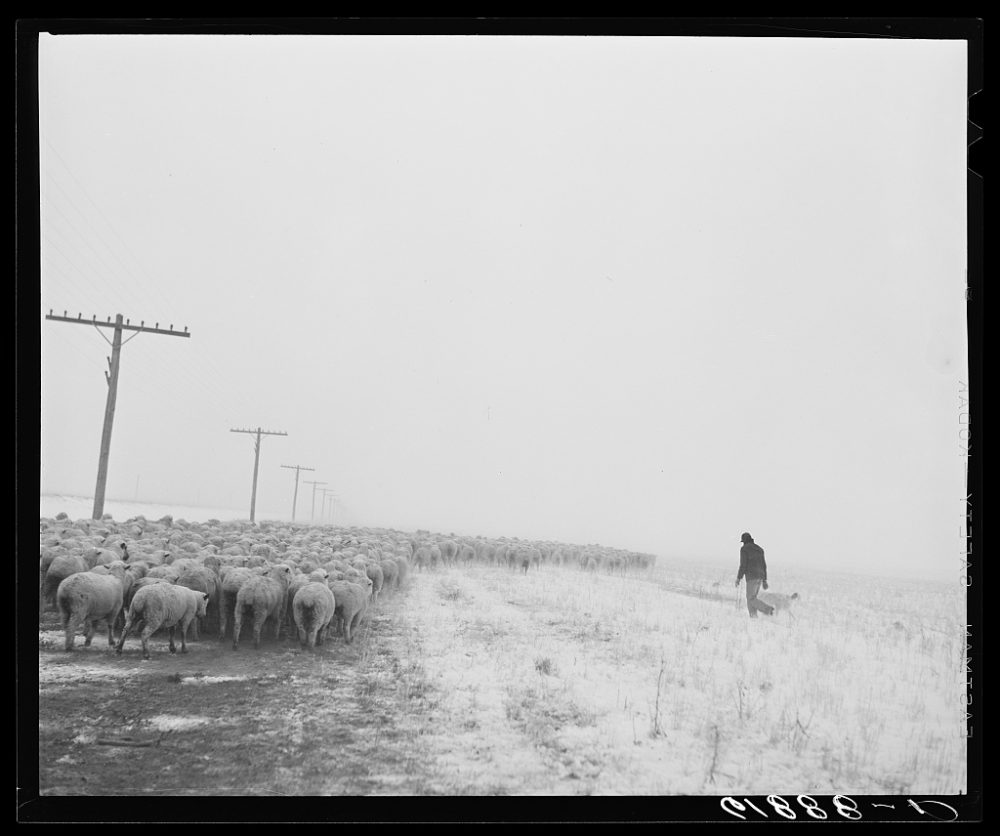
And it resonated deeply with me because I could relate.
The high plains of Colorado can be particularly vexing when the Arctic blast heads down along the front ranges of Colorado’s fourteen-thousand-foot peaks. Out there on the prairie, there is absolutely nothing to stop the wind and the horizontal snow. On days like this one, it was hard to tell if the snow was falling from the sky or if it simply was recycled from your neighbor’s place.
This was unlikely a neighbor’s snow on the Jolly ranch, however, because there were no neighbors. As Jim related to me, “You could ride horseback for 4 or 5 days flat out without leaving his ranch. Grandpa ran something like 30,000 head of ewes. When it came time to lambing, that would get the herd up to some 70,000 head, and they needed a sack full of country to graze them on.”
Jim went on: “If you flew over that country today, you could still see the occasional recycled battered wooden railway boxcar, now rotting into the ground, that Grandpa scattered across hundreds of square miles of rolling prairie. They were to keep his Basque sheepherders alive if the weather turned bad.”
The railcars became makeshift bunkhouses, replete with woodstoves and board beds to offer some shelter in a country that could be springtime balmy and prairie peaceful one day with birds singing and butterflies flitting, and the next, unbounded blizzard fury.
The ranch was productive, making Mr. Jolly one of the most successful ranchers along the front ranges of Colorado. Each year, at spring shearing time, the Jolly ranch filled to the brim 8 to 10 railway boxcars with wool. It was indeed the final heydays of wool and lamb in America.
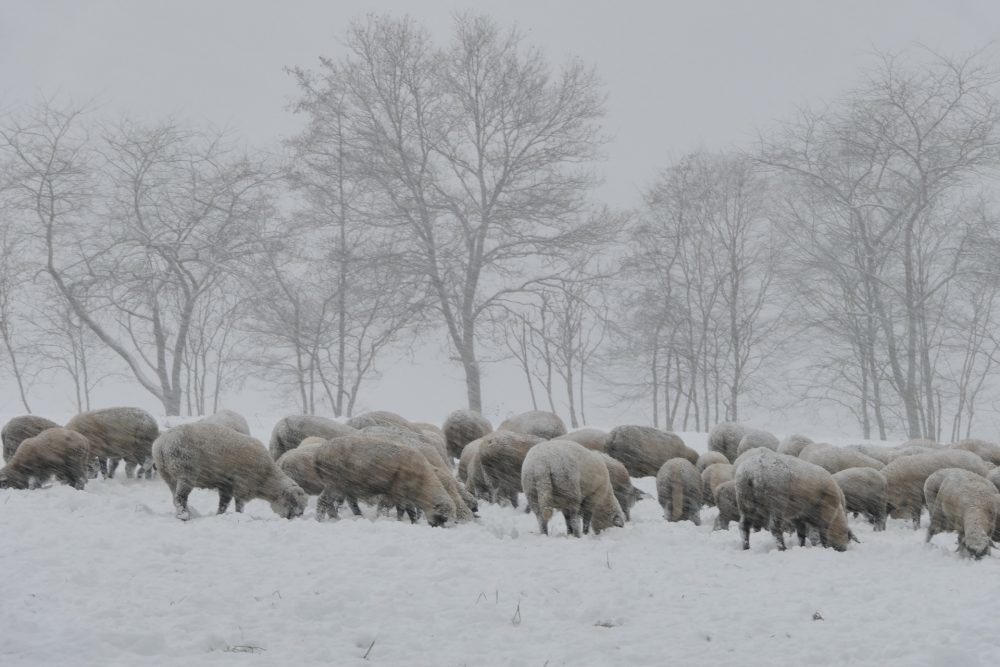
Who knew then that in just 20 years’ time, the US sheep herd would dwindle to a mere 1 percent of the maximum that it had reached with herds like Dave Jolly’s in the early ’70s?
But back to the Pontiac Bonneville. It was the first new car the Jolly’s had ever owned. They were finally making it in the sheep business. Dave had started with a tiny collection of ewes nearly 50 years prior, and, although some say sheep are “born trying to die,” they lived on the Jolly ranch, and multiplied.
The car, shiny fruit of years of hard labor on the ranges and lambing pens, was the couple’s pride and joy. It was showroom clean, and Albertine held Dave’s feet to the fire on this one: that car would be kept that way. Periodically, Grandma would have to turn to the grandkids in the back seat to “keep it down and stop their roughhousing” as Dave concentrated on the thin line of two fences providing him with his only sense of bearing, like lights along an airport runway.
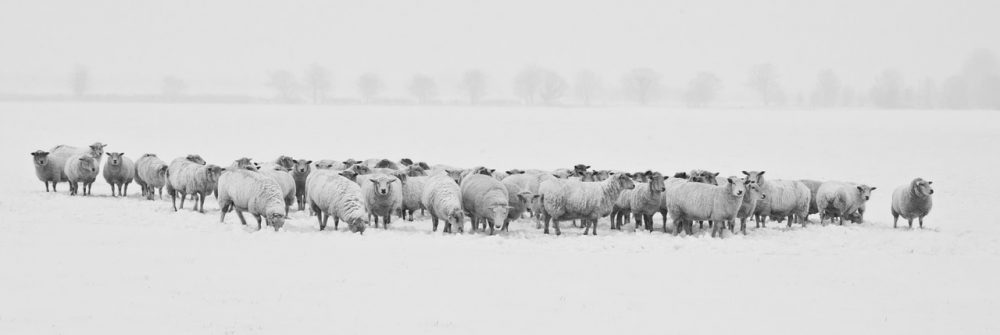
The blizzard worsened as they headed up the 25 mile long and straight-arrow dirt track to the ranch house. As they neared the ranch headquarters, they noted something different along the fence on the left: it was a series of dense darker toned stick-like objects protruding from the snow-blanketed prairie earth just on the other side of the woven wire fence.
Dale slowed the car down. He knew.
Jim and cousins gathered on the left side of the car and rubbed the fog off the window, and then they saw what their Grandpa was already seeing: they were the black legs of white snow-covered sheep. The Pontiac slowly cruised along them for over a mile, thousands of sheep standing tightly together, held back from being driven any further by the wind slammed up against the fence separating pasture from road on the shelter-less high plains landscape. The only thing the 7 sets of human eyes could really see was the flock’s blackish legs, the only part of the sheep that shed snow. The bodies of the sheep were completely encrusted and blended in ghostlike outlines and shapes with the driving flurries. Dale and crew had just sorted onto that pasture the day before—a sunny, yet breezy day, before the snow descended on them from wide open north.
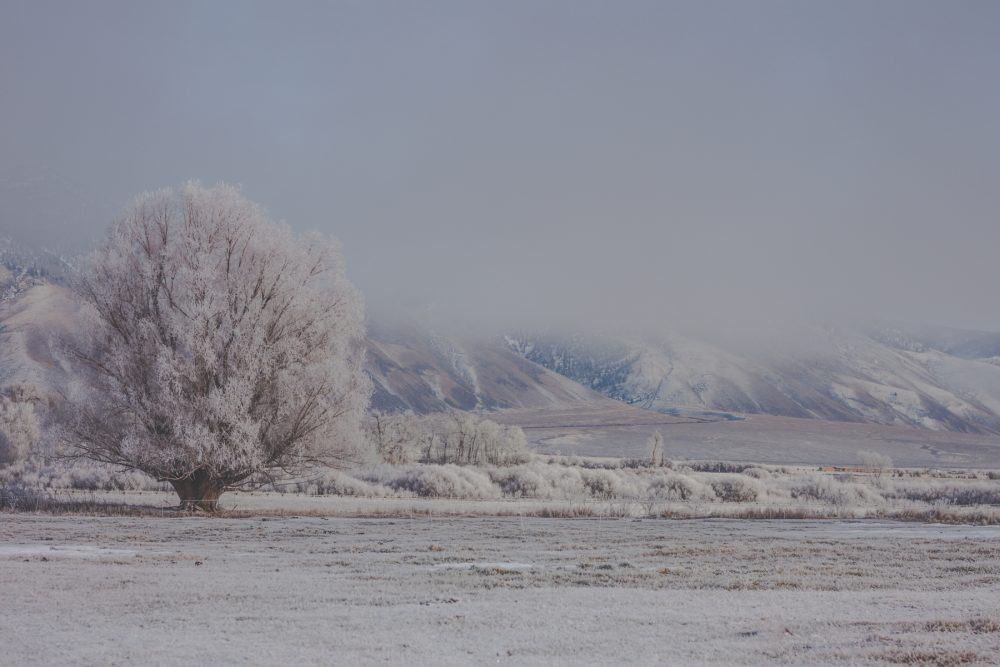
Thankfully, they were still alright. Dale and Albertine and grandkids continued, slowly, silently, eyeing their livelihood, and knowing that for now, the sheep were still OK. But if the blizzard continued, many could face certain death through suffocation in the deep snow that their very own gathering of standing bodies would generate through drifting of the snow.
Finally, the line of sheep ended, and once again, the fence stood alone, empty in the prairie wind.
Grandpa Dave breathed a slight sigh of relief, and slowly began to accelerate the Bonneville toward home—as much as he dared on the near invisible dirt road surface.
And then, he let off. There, through the blizzard fog emerged a single ewe. And there, by her side, a desperate sight: two tiny shapes in the whiteout; fresh lambs, still soaking wet, standing wobbly, snow caked and shivering in the driving snow along the fence. She had left the band to lamb on her own—nature’s own instinct in all birthing animals. But in this case, the loss of shelter of her sheep companions was a death sentence—for her babies first, and ultimately for her as well as she would desperately try to coax life into them.
Dave Jolly hit the brakes, and Bonneville slid to a stop. The rancher switched on, and church and family man switched off. Donning his hat, he opened the door to the blast, into the blizzard, and the family drew a gasping breath as the frigid wind and driving snow pasted the plush car interior and turned to water as it hit the authentic cherrywood dashboard trim.
The door slammed shut as five cousin’s sets of eyes clustered and peered out of the backseat side window. Busy little hands wiped the moisture off the glass so they could see, and watched their grandpa walk over to the tiny lambs and their snow-caked mother as she looked up from the fence line.
Dave lifted the woven wire fence enough to literally let the two lambs blow underneath, pushed by dense winter wind under the wire, and their mama followed. Then, in one scooping motion, Dave gathered the two lambs into his arms, facing the mother, crouched down, so she would follow by maternal bond her offspring despite the blizzard air. The cousins could barely hear the incessant bleating by the baby lambs, as the wind ripped the true volume of their cries away from them.
Mr. Jolly wisely let her touch noses to her offspring, thereby reassuring her by scent that indeed, these were her babies that he had in hand. He made his way backward to the waiting Pontiac, rag top now white with freshly plastered snow. Shifting the tiny bleating lambs to one of his strong but gentle hands, he reached to open the door, and 5 kids immediately received a full dose of great plains blizzard fury.

“Move over, kids!” Grandpa’s deep voice hollered through the wind. The cousins immediately obeyed, surprised and excited. Dave dropped the two soaking wet, muddy and snow blanketed bleating lambs on the immaculately clean and new car smelling plush back bench seat with 5 cousins in their spotless Sunday best.
“Move over more, kids!”
All cousins piled up on the far side of the seat, so Dave could push the lambs to the middle. And as he stepped back out of the open doorway, the ewe, ice crusted, muddy and a little bloody with afterbirth, obediently jumped in on the seat with them. And the seasoned sheepman knew that this would happen. And he did not make eye contact with Albertine before he shut the door.
He was met with the feeling of a palpable fury when he opened the driver’s door and took the wheel. Their eyes had not yet met, as the rancher focused his eyes forward through the pulse of the windshield wipers. There were no immediate words. There was just plenty of heat emanating from the passenger seat, hotter than the very sufficient blower fan conveying the warmth off the Pontiac big block engine.
Dave put the Pontiac in drive as they made their way toward headquarters. The cousins were jubilant to have two lambs and ewe with them in the back seat. They laughed and talked about their great fortune.
They stopped when Grandma started talking.
“What the Sam Hill are you thinking putting them sheep in our car?” It was the strongest string of cuss words the Sunday School teacher could muster in front of the cousins.
Rancher Dave Jolly thought for a few silent seconds, and without looking over at Albertine, his bride and stalwart companion over all these sheep-faring years, simply stated, “Well, I figure they paid for it.”
He then turned to face her. “And I figure they can ride in it too.”
And so, our lives, too, are inextricably intertwined with these, our charges. We have had newborn black Angus 70 lb. calves born in blizzards and frozen, eyes rolled back in their heads with no palpable pulse. We wrap them in our coats and sweaters and lift them into the pickup seat, then carry their lifeless and stiff forms into our bathroom and drop them in our own tub, filled with warm water. And they miraculously usually come back to life in the now muddy and black-haired water, twitching, then running across the living room carpet and kitchen, happily bawling, and looking for the milk bar, to which they are soon reunited, once dry and ready for winter winds.
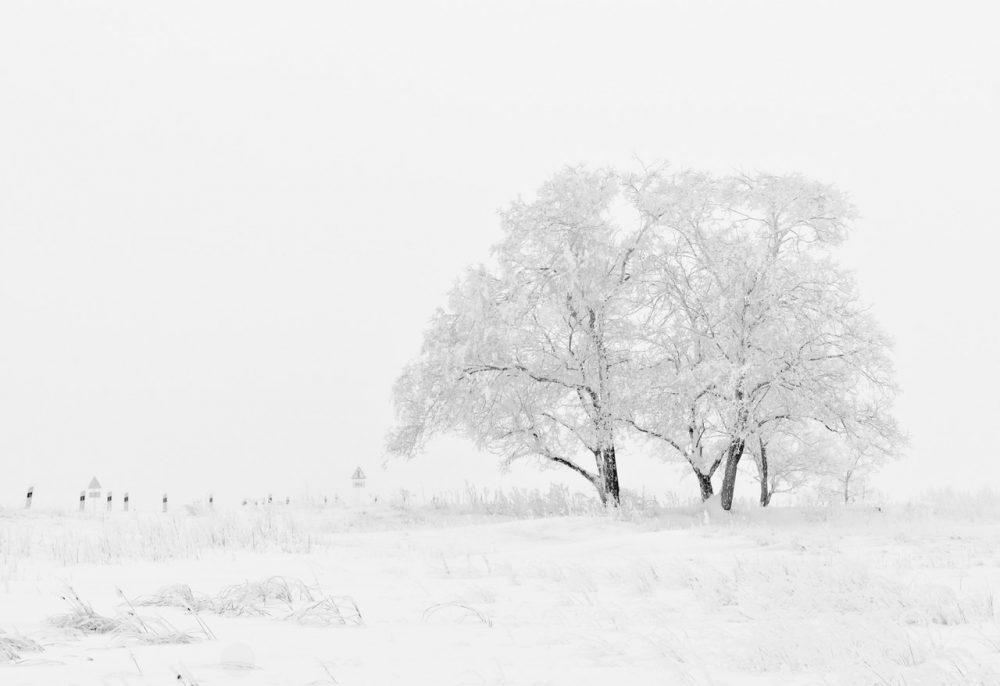
They become part of us, these animals. We live with them on Alderspring, literally ranging hundreds of miles together on horseback over the summer across wild and broken country. We protect them from wolves, mountain lions and bears and herd them to the best grass.
Despite it being upwards of 400 head, the girls give names to many of them as we learn of their personalities and physical appearance. We feel as if we’ve have been asked to care for them as they gather the goodness off the rich grasses of the ranges to ultimately provide food for us and you, our partners. I don’t sleep well if I think that all their needs are not being met. It is in my blood, and now, my family’s blood as well.
Thanks for entrusting us with the stewardship of these—our animal charges—and the lands they walk on. They are part of our way of making a life and living on the land and learning from it.
And besides, Bonneville seats—and others like them—will wash.
Happy Trails.
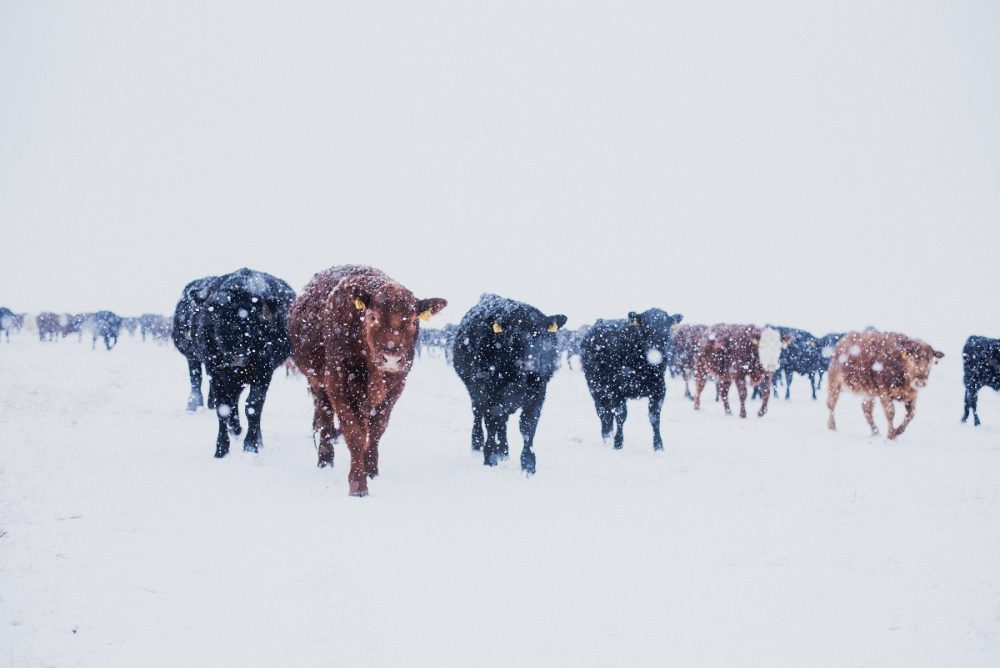

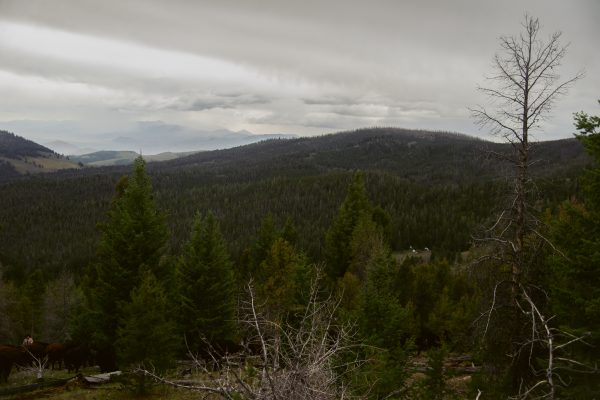

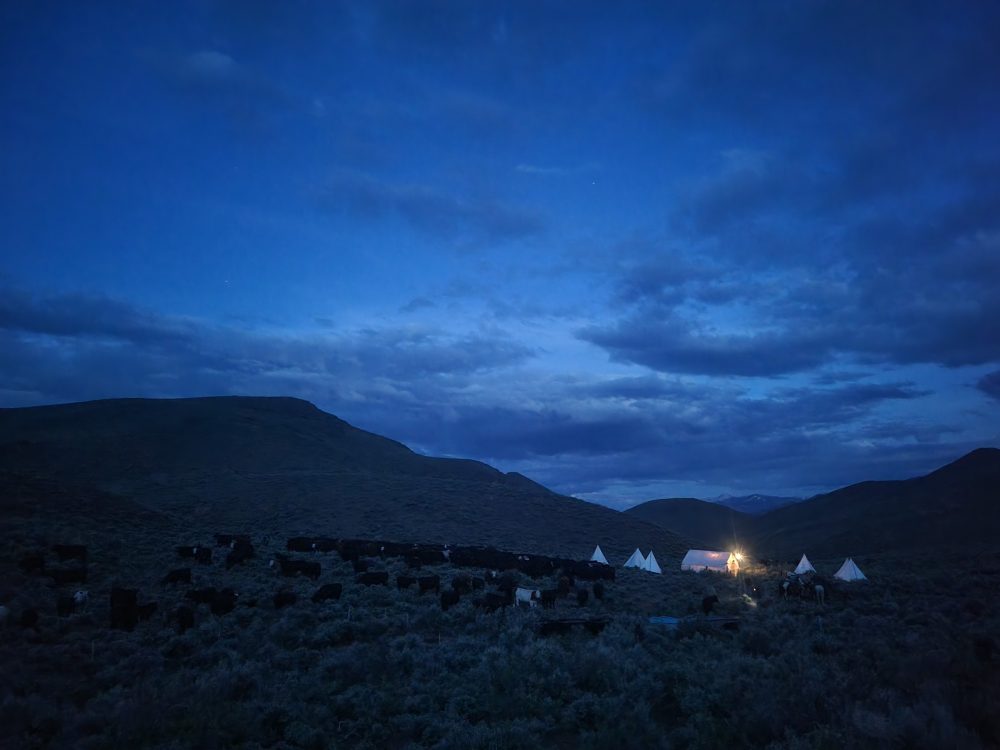


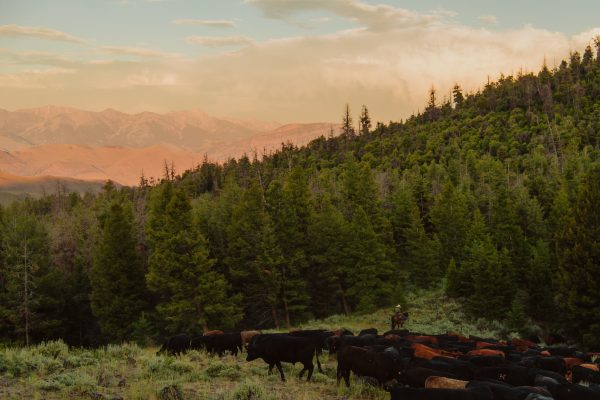
Mike and Phyllis Simplot
Thank you for the wonderful stories, history and sharing your way of life , for all of us who dream of our own small (tiny) version of what you and your family share.
Good Bless
Vicki Sinclair
Anyone who read this and doesn’tlike your prices should just go spit. I cried. What a a heartfelt story. Thank you. We are seniors and don’t have a lot of money, but we like good meat.
Robin Poupard
Totally enjoyed this story! Thanks…wow… ranching life is timeless, it seems.
Victoria J.
Such a good story! In the late ’60’s there were Basque shepherds all over Central California too. They would drive their flocks down roads to get from field to field. I loved it when they went past our house–the flocks filled the street between the houses, like a moving wooly ribbon. The dogs kept the sheep off the front yards.
Natalie
I believe this level of care is the least one must do when a decision is made to have animals in our lives. I know not all ranchers/farmers take this approach, but I’m very glad that you do, and that Dave did.